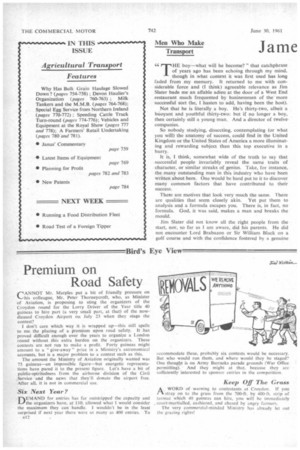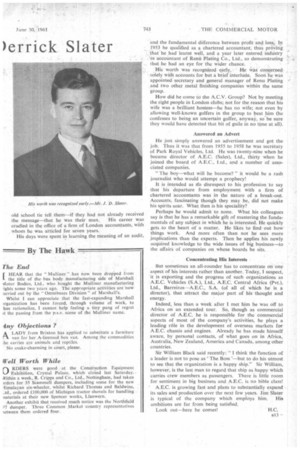Men Who Make Transport
Page 46

Page 47

If you've noticed an error in this article please click here to report it so we can fix it.
Jame )errick Slater
T ‘4 HE boy—what will he become?" that catchphrase
of years ago has been echoing through my mind. though in what context it was first used has long faded from my memory. It returned to me with considerable force and (I think) agreeable relevance as Jim Slater bade me an affable adieu at the door of a West End restaurant much frequented by businessmen of the more successful sort (he, I hasten to add, having been the host). Not that he is literally a boy. He's thirty-two, albeit a buoyant and youthful thirty-two: but if no longer a boy, then certainly still a young man. And a director of twelve companies.
So nobody studying, dissecting, contemplating (or what you will) the anatomy of success, could find in the United Kingdom or the United States of America a more illuminating and rewarding subject than this top executive in a hurry.
It is, I think, somewhat wide of the truth to say that successful people invariably reveal the same traits of character, or similar streaks of genius. Take, for instance, the many outstanding men in this industry who have been written about here. One would be hard put to it to discover many common factors that have contributed to their success.
These are motives that look very much the same. There are qualities that seem closely akin. Yet put them to analysis and a formula escapes you. There is, in fact, no formula. God, it was said, makes a man and breaks the mould.
Jim Slater did not know all the right people from the start, nor, so far as I am aware, did his parents. He did not encounter Lord Brabazon or Sir William Black on a golf course and with the confidence fostered by a genuine
old school tie tell them—if they had not already received the message—that he was their man. His career was cradled in the office of a firm of London accountants, with whom he was articled for seven years.
His days were spent in learning the meaning of an audit, and the fundamental difference between profit and loss. In 1953 he qualified as a chartered accountant, thus proving that he had learnt well, and a year later entered industry as accountant of Renu Plating Co., Ltd., so demonstrating that he had an eye for the wider chance.
His worth was recognized early. He Was concerned solely with accounts for but a brief interlude. Soon he was appointed secretary and general manager of Renu Plating and two other metal finishing companies within the same group.
How did he come to the A.C.V. Group? Not by meeting the right people in London clubs; not for the reason that his wife was a brilliant hostess—be has no wife; not even by allowing well-known golfers in the group to beat him (he confesses to being an uncertain golfer, anyway, so be sure they would have detected that bit of guile in no time at all).
Answered an Advert He just simply answered an advertisement and got the job. Thus it was that from 1955 to 1958 he was secretary of Park Royal Vehicles, Ltd. He was twenty-nine when he became director of A.E.C. (Sales), Ltd., thirty when he joined the board of A.E.C., Ltd., and a number of associated companies.
"The boy—what will he become?" it would be a rash journalist who would attempt a prophecy!
It is intended as rfo disrespect to his profession to say that his departure from employment with a firm of chartered accountants was in the nature of a break-out. Accounts, fascinating though they may be, did not make his spirits soar. What then is his speciality?
Perhaps he would admit to none. What his colleagues say is that he has a remarkable gift of mastering the fundamentals of any subject in which he is interested. He quickly gets to the heart of a matter. He likes to find out how things work. And more often than not he sees more implications than the experts. Then he applies his newly acquired knowledge to the wide issues of big business—to the affairs of companies on whose boards he sits.
Concentrating His Interests But sometimes an all-rounder has to concentrate on one aspect of his interests rather than another. Today, I suspect, it is exporting and the progress of such organizations as A.E.C. Vehicles (S.A.), Ltd., A.E.C. Central Africa (Pvt.), Ltd., Barreiros—A.E.C., S.A. (of all of which he' is a director), that attract the major part of his thought and energy.
Indeed, less than a week after I met him he was off to Africa on an extended tour. So, though as commercial director of A.E.C. he is responsible for the commercial aspects of most of the company's activities, he plays a leading role in the development of overseas markets for A.E.C. chassis and engines. Already he has made himself aware, by personal contacts, of what goes on in Africa, Australia, New Zealand, America and Canada, among other countries.
Sir William Black said recently: "1 think the function of a leader is not to pose as 'The Boss '—but to do his utmost to see that the organization is a happy ship." Sir William, however, is the last man to regard that ship as happy which carries crew members as passengers. There is little room for sentiment in big business and A.E.C. is no bible class! " A.E.C. is growing fast and plans to substantially expand its sales and production over the next few years. Jim Slater is typical of the company which employs him. His ambitions are far from being satisfied.
Look out—here he comes! H.C.




































































































































































